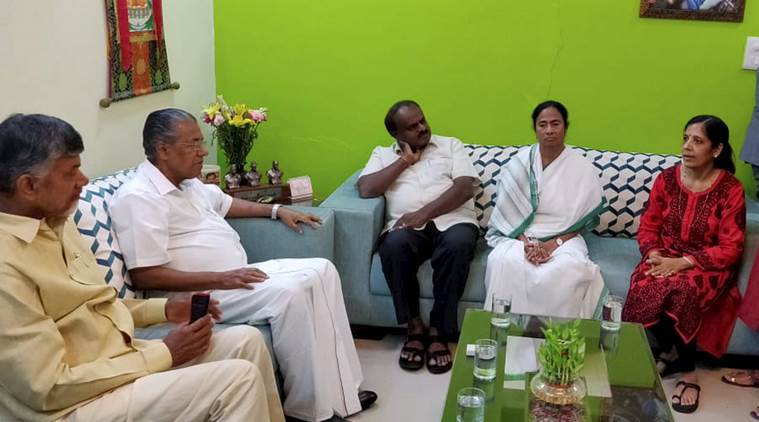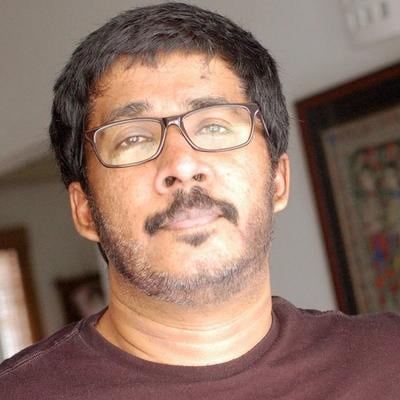United against Modi, divided at home: Kejriwal’s crisis shows how the 2019 polls might be fought
A pre-poll national alliance, as opposed to regional alliances, is not consistent with the autonomous aspirations of people. If it hasn’t happened naturally in the past, the BJP is now making it happen by usurping the rights of the states as it did in Delhi.

Mamata Banerjee (second from right), H D Kumaraswamy (third from right), Pinarayi Vijayan (second from left) and N Chandrababu Naidu (left) during a meeting with wife of Delhi Chief Minister Arvind Kejriwal, Sunita. (PTI Photo/twitter)
As the face-off between the Lieutenant Governor (LG) of Delhi and the Aam Aadmi Party – which is effectively a direct confrontation between Chief Minister Arvind Kejriwal and Prime Minister Narendra Modi – continues, the Opposition seems to have figured out its strategy against the BJP for the 2019 Parliament elections.
The recent Uttar Pradesh by-elections and the Karnataka Assembly elections gave a heads-up on what the opposition lineup is likely to look like in 2019. However, the Delhi crisis has redefined it, with two political arch rivals like CPM’s Pinarayi Vijayan and Trinamool Congress’s Mamta Banerjee, shedding their rivalry to become part of a pro-Kejriwal – or anti-BJP – alliance. If Karnataka Chief Minister H D Kumaraswamy’s swearing in – where almost all the opposition leaders joined hands – was the first step, this was clearly the next step.
Although both Vijayan and Banerjee, whose cadre fight battles on the streets of West Bengal, would have felt awkward strategising for a common cause, their respective parties appear to have realised that a Federal India needs two seemingly conflicting strategies – one for the states, and the other for the Centre.
The parties can fight each other in their respective states, but can join hands in taking on the common enemy at the Centre. It’s not about morality or ideology, but about practical politics in a bourgeois democracy, that too when the Centre is apparently going against the tenets of federalism. The strategy in one state needn’t be imitated in another, as the CPM had done in the past by aligning with the Congress in Tamil Nadu, while fighting them in Kerala.
While only opposition parties that rule states have formally come to the rescue of Kejriwal presently, other parties are chipping in. When the ring expands, it will be a broad alliance of parties with divergent political interests as seen during Kumaraswamy’s swearing-in ceremony.
CPM General Secretary Sitaram Yechury was the first to figure out, and articulate, this twin strategy – one for a state and another for the Centre. His party is at its vituperative best against the Congress in Kerala, but has no problem in rooming with Rahul Gandhi when it comes to taking on the BJP, or deriding Modi’s fitness challenge video. Circumstances have now made Kejriwal another catalyst in taking this strategy forward.
The new national alliance against the BJP will be regional alliances – both the local and national parties choosing their best interests at the provincial level, but coming together in Delhi, irrespective of their differences. There cannot be a nationwide pre-poll United Progressive Alliance across the country in 2019, but only fragments of it. However, after the elections, they can come together just like drops of mercury merging together in pursuit of a minimum surface area.
In other words, regional is the new national and that’s what was seen in Kejriwal’s drawing room. It’s also what India’s federalism, a union of states, demands.
Why the alliance matters
India is not a Delhi-centric monolith, but a union of autonomies, a coming together of regional interests and socio-cultural identities for a common national good. A strong Centre is an old and regressive idea and tries to homogenise the multi-faceted autonomies of Indian states. Chief Ministers such as Jayalalithaa and M Karunanidhi always spoke against it, with the former even taking the Centre to task whenever she found an encroachment.
A pre-poll national alliance, as opposed to regional alliances, is not consistent with the autonomous aspirations of people. If it hasn’t happened naturally in the past, the BJP is now making it happen by usurping the rights of the states as it did in Delhi. Many states, particularly in the south, are also peeved that their rights and resources are being taken away by the Centre through GST and the 15th Finance Commission. The vertical programmes and policy interventions on state subjects also violate the constitutionally guaranteed autonomy of the states.
Interestingly, Kejriwal, who has so far been indulging in exclusivist and self-righteous politics, also seems to be coming around. He was a little reluctant about mixing with opposition leaders at Kumaraswamy’s swearing in, but when the four chief ministers travelled an extra mile in his support, he seemed to have mellowed down.
When he broke into politics in 2015 after riding a spontaneous social ferment in 2012 as a civil society activist, Kejriwal was unique because no one in Indian history had risen to power in such a short time. He built the AAP ship while sailing it. The inevitable political formalisation and institutionalisation had to happen in a hurry and he managed it with minimal collateral damage. But he chose be a lone ranger, playing it alone.
However, after finding a common enemy in the BJP – whether or not Kejriwal is ideologically opposed to it like the Congress and the CPM – is finally mainstreaming him. Circumstances will also compel him to be a part of regional alliances, or lose relevance.
The pressure both the BJP and its government at the Centre exerted on him has not just been annoying, but has been undermining his role as a Chief Minister. By restraining him with controls on administration and legislation, and letting loose a Lieutenant Governor who can stall almost everything he does, the Centre has made him almost immobile. By continuing to retain the most crucial portfolios of law and order and land – and allegedly sitting on many other reforms – it practically caged him.
The recent alleged non-cooperation of IAS officers and Kejriwal’s inability to sort it out because the Centre is allegedly hand-in-glove, is an extraordinary situation that no state in India has gone through. Instead of working with the political executive, the officers seem to be on their own, which in reality is a breakdown of governance. The administration cannot work in a vacuum, without policy guidance of the political executive. The job of officers is not to make policies, but to implement them. If they don’t listen to the policy makers, it’s certainly an extraordinary crisis that requires extraordinary responses.
”I want to request Modiji with folded hands not to trouble the people of Delhi. Your fight is with me. Beat me or take as much revenge as you want against me. But do not try to stop good work in Delhi which is being praised world-wide including by the UN.” This is what Kejriwal said in 2016. That he is saying exactly the same things in 2018 shows how vile his political detractors have been.
Meanwhile, it’s not strange that the Congress hasn’t yet formally joined Kejriwal in the latest struggle because it’s still licking the wounds it suffered at his hands. In fact, while the UPA was in power, he was probably more scathing against the Congress than the BJP. It’s probably hard to forget the humiliation, whether his charges against Robert Vadra or his tirades against the Congress on the alleged AugustaWestland scam – both directly targeting Sonia Gandhi.
Moreover, a truck with Kejriwal will also diminish the political space of the Congress’s local leaders, with the party likely to become just a shadow of its past self. Ultimately, it will have to come around, because there’s simply no space for an old-style national party against another national party. The idea of a national party for a union of autonomies is unnatural.
For all the latest Opinion News, download Indian Express App
© IE Online Media Services Pvt Ltd
More From G Pramod Kumar
- Chengannur bye-election: Without change in leadership and anti-BJP strategy, Congress will lose Kerala tooAn occasional bypoll doesn’t foretell anything, but this one should seriously worry Congress because it’s the continuation of a trend that it has landed itself…
- After Kaala trailer release, it’s clear Rajinikanth will not be swinging in favour of BJPWhat makes Kaala politically more precise is that it’s happening in India, or more precisely in a terrain where the Tamil regional nationalism can take…
- Kudankulam vs anti-Sterlite protests: Why Tamil Nadu ignored one and is backing the otherThe protests in Thoothukkudi bear striking similarities to those against the nuclear plant in Kudankulam. So why did the Kudankulam agitation fail? ..







































No hay comentarios:
Publicar un comentario